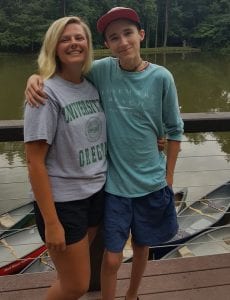Camp, Nature’s Way of Feeding Mosquitos
It’s that time of year when parents start to make plans for the summer. Summer is such an important time for families to be together, to take special trips, and for children to recharge from the busy school year. Summer is also a great time to try out new activities at a summer camp. Summer camps offer a valuable opportunity for learning that can’t be done in a classroom setting and can benefit your child for the rest of the year.
I spent summers as a child going to Girl Scout camp and have many happy memories of learning to swim in a lake, canoeing, backpacking and singing around the campfire. I wanted my children to have that experience as well and they both attended day and overnight camps. Honestly, I can say they didn’t love every camp experience! My daughter didn’t like any one day camp because “the counselors were mean” and when I pressed her for details she said “They never smiled!” My son attended scout camp where he had an awful time, hated the food, the cabins and experienced bullying. Needless to say they didn’t return to those camps! However, we did find a wonderful traditional camp in the mountains of North Carolina that they both loved and looked forward to all year long. They returned every summer and when they got home we used the expression “camp sick” to describe how much they missed it! This summer will be my teenage son’s last to attend as a camper and when I asked him what camp has meant to him, he had difficulty putting it into words. There is a “camp magic” of treasured traditions, activities and an experience that seems to exist in a separate space and time. I think I can say for him that those are the things that he looks forward to and what makes camp so special. Most of the year he is connected to his cell phone and computer. At camp, it is a time of digital detox-no cellphone, computer or TV. It is a time to interact face to face and live in community. He has made friends that live in other cities and countries and he looks forward to seeing them each summer. He also looks forward to seeing the counselors each year and looks up to them as role models.
Camp gives children a chance to connect with nature and try new activities that they wouldn’t otherwise get to experience, and build self-confidence. It is a safe place to take risks, face challenges and build their self-esteem in a safe, supervised and supportive environment. It is a place to have the freedom to be yourself and have a sense of belonging in a community. It is a chance to develop resilience and independence. Camp gives children a chance to develop the skills that will enable them to live on their own as adults. It is a place to develop their “emotional intelligence,” an ability to manage emotions and work together with others cooperatively. Camp is good for parents too! In this day and age of “helicopter parents” it’s hard for some parents to allow their children to be away for an extended time. A good part of parenting is finding the balance between protecting your child, keeping them safe and providing opportunities for growth. Successful parenting is a process of preparing your child for adulthood and a good camp can teach those skills. Parents might find that letting go just a little bit helps to strengthen their relationship. If your child is comfortable spending the night away from you with friends and family, they might be ready for overnight camp as young as seven years of age. Many overnight camps have shorter sessions for the youngest campers. My children attended a camp where siblings could attend at the same time but the girls and boys camps were separate. My son who wasn’t as outgoing as his sister and felt ready for camp after visiting several years in a row when we dropped off his sister and he saw how much she enjoyed it. He felt better being away overnight since she was there at the same time. Now nine years later he is happy to go for a month long session.
There are about 5,000 summer camps in the U.S. How do you choose the right one? There are traditional camps, specialty camps- like sports, special needs, religious, day and overnight camps. Here are a few ideas specifically when considering an overnight camp.
1. Involve your child in the decision making process, consider their interests, look at websites, watch camp videos, and visit open houses if available.
2. Look at the camp’s history, how long has it been in operation? Do former campers send their children there? How experienced are the camp directors? Try to speak directly with the directors to learn about the camp. Ask for references.
3. What is the camp’s philosophy? Is it structured? Is the camp to have fun or foster growth? Does it share your family values?
4. Look at the camp counselors, how many are former campers? How many return each year? What does the director look for in their hiring? How extensive are they interviewed, are background checks done? How are they trained in safety? What is the average age of counselors? What is the ratio of campers to counselors?
5. What is a typical day’s schedule? Does the camper have choice in their schedule? How long are the sessions? What is a typical menu? What are the sleeping arrangements, bathrooms/showers?
6. What is the cost? Are there scholarships available?
7. Is the camp accredited by the American Camping Association? ACA membership verifies that the camp complies with up to 300 individual standards
For more information contact the American Camping Association
The doctors of KPA hope you all have a wonderful summer! Don’t forget to schedule that camp physical!
(My son and daughter and camp)


